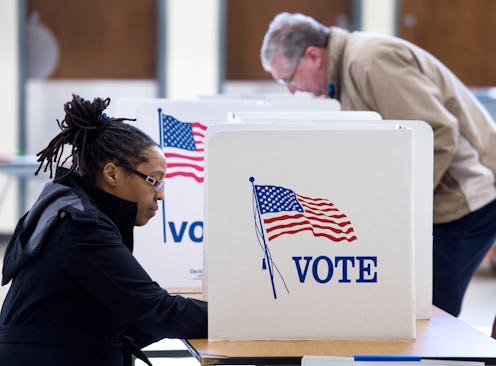News
Here's What's Expected To Happen In Oregon
Oregon holds its primaries on Tuesday, with 61 pledged Democratic and 28 Republican delegates at stake. Donald Trump may be the only Republican candidate officially still running, but former competitors Sen. Ted Cruz and Gov. John Kasich remain on the ballot. On the Democratic side, Sec. Hillary Clinton seeks to expand her lead beyond the reach of Sen. Bernie Sanders, who is not giving up. Who will win the Oregon primaries?
As always, we can't know for sure until the tallies are in. But we can speculate a bit. Oregon is interesting because, unlike many states, it allocates its Republican delegates on a proportional basis. Trump will probably win more than any other non-running candidate, but if a good number of protest voters turn out to the primary, he could walk away with only a small chunk of the already-small delegate haul offered by the state.
There's much more at stake on the Democratic side. There is a 280 delegate gap between Sanders and Clinton. With few contests remaining (though we should note that California has a whopping 475 pledged delegates up for grabs in June), every delegate Sanders can get his hands on is significant. But can he expect to win in Oregon on Tuesday?
Unfortunately, there's been one measly poll out of the state, so there's not much to go off there. That one poll showed Clinton with a 15 percent lead. Only 304 people were polled. The pollsters also adjusted the numbers to suggest what they could predict if voter turnout was especially high on Tuesday; in this scenario, Clinton had a seven percent lead.
But Sanders' prospects hinge not only on turnout overall, but on turnout demographics. Young people have overwhelmingly preferred Sanders to Clinton throughout the primaries thus far, and a high youth turnout would bode very well for the Vermont senator. And turnout, particularly among youth, may be higher than usual this year thanks to Oregon's new automatic voter registration law.
Residents of Oregon are now automatically registered to vote when renewing or obtaining a state ID or license. According to The Oregonian, the number of people aged 18 to 29 in the state who are registered to vote went up by 21 percent since the fall, a growth rate far higher than any other age bracket.
However, it's important to note that people who are automatically registered are designated as unaffiliated with any party, and Oregon's primaries are closed, so people can't participate unless they took it upon themselves to officially change their affiliation. Associated Press reported that only 25 percent of those automatically registered did so. If a good chunk of those weren't younger voters who changed their affiliation to Democrat, the increase in registered voters in the state may not benefit Sanders much on Tuesday.
Trump will probably get more delegates than any other Republican on the ballot, though not a whole lot, since the state has so few. As far as the Democrats go, there are some favorable elements in place for Sanders, although Clinton generally performs better in closed primaries (not caucuses). Oregon's Democratic primary could be a nail-biter.
